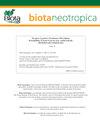From genes to ecosystems: a synthesis of amphibian biodiversity research in Brazil
IF 1.2
4区 环境科学与生态学
Q3 BIODIVERSITY CONSERVATION
引用次数: 1
Abstract
Abstract Here, we summarize examples of significant advances in amphibian research supported by the São Paulo Research Foundation (FAPESP), focusing on recent discoveries in the fields of community ecology, habitat change, infection diseases, and multipurpose DNA sequencing. We demonstrated that FAPESP has been fundamental not only by directly funding research projects and scholarships, but also through its science training policy, fostering international collaborations with world-class research institutions, improving and consolidating new lines of research that often depended on a synergetic combination of different knowledge and complex tools. We emphasized that future studies will continue to focus on basic questions, such as description of new species, as well as taxonomic and systematic corrections. Furthermore, we also expect that there will be a strong integration among different disciplines using novel bioinformatics tools and modeling approaches, such as machine learning. These new approaches will be critical to further develop our understanding of foundational questions of amphibian life-history trait variation, disease transmission, community assembly, biogeography, and population forecasts under different global change scenarios such as agricultural expansion, agrochemical use, habitat loss, and climate change.从基因到生态系统:巴西两栖动物生物多样性研究综述
本文总结了圣保罗研究基金会(FAPESP)支持的两栖动物研究的重大进展,重点介绍了在群落生态学、栖息地变化、传染病和多用途DNA测序等领域的最新发现。我们证明,FAPESP不仅通过直接资助研究项目和奖学金,而且通过其科学培训政策,促进与世界级研究机构的国际合作,改善和巩固往往依赖于不同知识和复杂工具的协同组合的新研究线,发挥了根本作用。我们强调,未来的研究将继续集中在基本问题上,如新物种的描述,以及分类和系统校正。此外,我们还期望使用新的生物信息学工具和建模方法(如机器学习)在不同学科之间进行强有力的整合。这些新方法将有助于进一步发展我们对不同全球变化情景(如农业扩张、农用化学品使用、栖息地丧失和气候变化)下两栖动物生活史、性状变异、疾病传播、群落聚集、生物地理学和种群预测等基础问题的理解。
本文章由计算机程序翻译,如有差异,请以英文原文为准。
求助全文
约1分钟内获得全文
求助全文
来源期刊

Biota Neotropica
BIODIVERSITY CONSERVATION-
CiteScore
2.90
自引率
16.70%
发文量
0
审稿时长
4-8 weeks
期刊介绍:
BIOTA NEOTROPICA is an electronic, peer-reviewed journal edited by the Program BIOTA/FAPESP: The Virtual Institute of Biodiversity. This journal"s aim is to disseminate the results of original research work, associated or not to the program, concerned with characterization, conservation and sustainable use of biodiversity within the Neotropical region.
Manuscripts are considered on the understanding that their content has not appeared, or will not be submitted, elsewhere in substantially the same form, because once published their copyrights are transferred to BIOTA NEOTROPICA as established in the Copyright Transfer Agreement signed by the author(s).
 求助内容:
求助内容: 应助结果提醒方式:
应助结果提醒方式:


